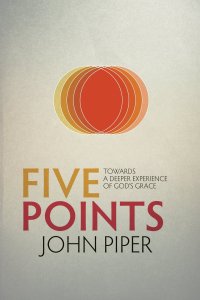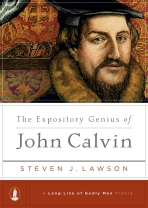 “The Doctrines of Grace” — “Calvinism” — “Reformed Theology” — “TULIP”
“The Doctrines of Grace” — “Calvinism” — “Reformed Theology” — “TULIP”
Call them what you will, the five points of Calvinism have been among the most hotly debated topics in Christian theology for centuries. However, there has been a resurgence of Reformed Theology in Evangelicalism in the last couple of decades, led in part by Pastor John Piper. In a strong line of theologians, including the likes of Calvin, Luther, Spurgeon, Edwards, Owen, and many others, John Piper has lived his life and conducted his ministry in a way that everything screams out to glorify God because of His loving, electing, saving grace. In his new book, Five Points: Towards a Deeper Experience of God’s Grace, Piper introduced the Doctrines of Grace in a way that is very accessible and engaging to readers of all levels.
He starts the book with a short preface describing the purpose of the book and then moves on to a brief discussion of the historical roots of Calvinism. The next five chapters give a brief discussion of each point in TULIP (Total Depravity, Unconditional Election, Limited Atonement, Irresistible Grace, and Perseverance of the Saints), with the U and the I switched in the order of chapters. He makes this switch, he says, because “over the years my experience has been that most Christians have a conscious, personal experience of irresistible grace, even if they have never called it that” (25).
These five chapters on each point of Calvinism are very brief, but very good. For those that are quite familiar with Calvinism, there will be little new here. However, for those for whom this is new, or for those who have been going back and forth, trying to make sense of it all, these chapters are excellent introductions to the subject.
The final two chapters are a nice addition to this short book on Calvinism, giving the reader a personal insight into what these doctrines have meant for Piper himself (chapter 8) and for various men throughout church history (chapter 9).
As someone who has been powerfully impacted by the ministry of John Piper, I found chapter 8: “What the Five Points Have Meant for Me,” to be a very helpful, personal insight into what these doctrines have meant in the life and ministry of John Piper. He gives 10 effects on his life of believing in the doctrines of Calvinism:
- These truths make me stand in awe of God and lead me into the depth of true God-centered worship
- These truths help protect me from trifling with divine things
- These truths make me marvel at my own salvation
- These truths make me alert to man-centered substitutes that pose as good news
- These truths make me groan over the indescribable disease of our secular, God-belittling culture
- These truths make me confident that the work which God planned and began, he will finish — both globally and personally
- These truths make me see everything in the light of God’s sovereign purposes — that from him and through him and to him are all things, to him be glory forever and ever
- These truths make me hopeful that God has the will, the right, and the power to answer prayer that people be changed
- These truths remind me that evangelism is absolutely essential for people to come to Christ and be saved, and that there is great hope for success in leading people to faith, but that conversion is not finally dependent on me or limited by the hardness of the unbeliever
- These truths make me sure that God will triumph in the end
Though I am quite familiar with the doctrine of Calvinism and cherish the truths myself, I found my heart stirred anew while reading this book, caught up again in cherishing God for who He is as the Almighty, Sovereign Redeemer. For those of you who are not very familiar with these doctrines, I would think that there is probably no better place that you could start than here. Clocking in at under 100 pages (!!), Piper writes in a clear, compelling, and compassionate way, urging the reader, with a pastor’s heart, to accept these five points towards a deeper experience of God’s grace.
See Piper introduce the book in the video below. Also, you can read Tim Challies’ review here
In accordance with FTC regulations, I would like to thank Christian Focus Publications for a copy of this book in exchange for a fair and honest review.



